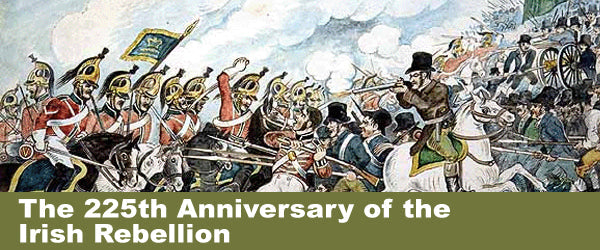
Posted by The Home School in the Woods Team on
By Sam Pak
The 1798 Irish Rebellion was a pivotal event that would influence the shaping of the United Kingdom of Great Britain and Ireland.
In the wake of the American Revolution several years prior, countries like France and Ireland were inspired to take up arms against their own political authorities. The Irish Rebellion of 1798 was spurred by many factors in Great Britain and Ireland, including religious discrimination and male suffrage.
Let’s explore some of the deeper reasons for what led to such an intense period in the history of the United Kingdom.
Ireland Rebels
The Irish Rebellion of 1798 was a significant event in Irish history that marked a turning point in the struggle for independence from British rule. The rebellion was driven by a long-standing desire among Irish nationalists to establish a republic in Ireland, free from British control.
The rebellion was led by a group of Irish nationalists known as the United Irishmen, who were inspired by the ideals of the French Revolution and sought to establish a democratic government in Ireland. The United Irishmen were a diverse group, composed of both Protestants and Catholics, and included many prominent figures from Irish society, such as Charles Lucas, an apothecary from Dublin and a central insurrectionist figure who inspired the Irish patriot movement.
The 1798 Irish Rebellion began in May, launching a series of coordinated attacks across Ireland upon British-led regions. The rebels achieved some success, with large parts of the country falling under their control. The British government responded with overwhelming force, deploying thousands of troops into Ireland. They forced a policy of marginalized repression that included martial law and the suspension of civil liberties.
Despite the British response, the rebellion continued to rage for several months, with both sides engaging in conflict. Before long, Britain quashed the Irish forces, driving many of their leaders into exile.
A Bridge Too Far
One of the critical factors that led to the rebellion was the deep-seated resentment that many Irish people felt toward British rule. The British had controlled Ireland since the 12th century, and they had a long history of relegating the Irish to second-class citizens. The Irish were subject to a range of discriminatory laws and practices, including the Penal Laws, which restricted their rights and freedoms based on their religion.
The United Irishmen were also motivated by a desire for democratic reform. They were inspired by the ideals of the French Revolution, which had seen the overthrow of the monarchy and the establishment of a democratic republic. The United Irishmen sought to establish a similar system of government in Ireland, with the ultimate goal of securing Irish independence.
The rebellion saw spurts of success, claiming parts of the country for the United Irishmen. Yet, the British would not sit idly by, and their response was swift and merciless. The government declared martial law, suspended civil liberties, and deployed thousands of troops to quell the rebellion.
The rebels were ultimately defeated, with many leaders captured, executed, or forced into exile.
Despite its failure, the rebellion significantly affected Irish nationalism. It inspired a new generation of activists to continue the struggle for independence and helped to pave the way for the eventual establishment of an independent Irish state in 1922.
From Bad to Worse
The political aftermath of the 1798 rebellion was the most consequential part of it all.
The end of the fighting was truly not the end of the conflict; the British were not finished. Their political domination bore punitive policies and violence, capturing and killing innocent civilians.
The British government introduced a series of measures to tighten their grip over Ireland, including the Union with Ireland Act of 1800, which abolished the Irish Parliament and brought Ireland fully under British occupancy and rule. This led to a long period of British authority in Ireland, marked by repression, discrimination, and economic hardship put onto Irish citizens.
Although the rebellion might have failed, it was not fruitless. It renewed Irish nationalism, inspiring new generations of activists to continue the struggle for independence. The attempted revolution remains a powerful symbol of Irish resistance to British rule, and its legacy continues in Ireland still.
The Desire for Freedom
The Irish Rebellion of 1798 remains a significant hallmark of Irish resistance to British rule and stands as a seminal moment in the struggle for Irish independence. It reminds us of the deep-seated desire for freedom and democracy that has driven the Irish people for centuries. It is a testament to the resilience and determination of those who have fought for Irish independence.
If you’d like to learn more about the 1798 Irish Rebellion, or other revolutions throughout history, like the American Revolution, French Revolution, or Mexican Revolution, you can find them in our Timeline Figure sets!
Share this post
- 0 comment
- Tags: Timelines, World History
